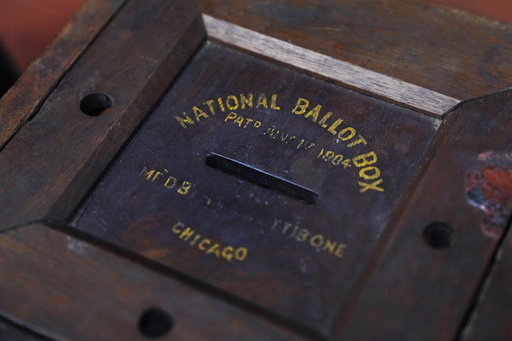
CONCORD, N.H. — As New Hampshire gears up for the upcoming elections, a group of experts gathered on Thursday to reflect on the measures the state has put in place to ensure the integrity of the voting process, particularly when it comes to both casting and counting the votes.
In a setting filled with historical voting artifacts at the state archives, Secretary of State David Scanlan was accompanied by former Secretary of State Bill Gardner and several others who have played key roles in evaluating and, at times, rejecting new voting technologies.
Kurt Hyde, who taught computer science at Rivier University, shared insights on the identification of issues with ballot counting machines back in the 1980s. His efforts led to the organization of the first national symposium on computers and elections in 1986, and he collaborated with Gardner and legislators to enact a law in 1994 that mandated the use of paper ballots.
“It stipulates that no voting machine or device may be utilized in any election within our state unless it processes the voter’s selection on a paper ballot and is of a type approved by the ballot law commission,” he indicated. “This marked the introduction of the first-ever paper trail law in the country.”
Despite calls from former President Donald Trump and several Republican figures for exclusive use of paper ballots in the upcoming elections, it’s noteworthy that nearly all states already generate paper ballots or records for every vote. According to estimates from the Brennan Center at New York University, around 98% of all votes nationwide are expected to be cast on paper for this year’s presidential election.
The legislation enacted in New Hampshire in 1994 aligns with earlier initiatives aimed at ensuring both the confidentiality of voting results and their accuracy. The state implemented the secret ballot system in 1891, just three years after it was first adopted in Louisville, Kentucky. Additionally, during the 1980s, New Hampshire prohibited the use of punch card voting machines, well in advance of the issues they would later cause during the 2000 presidential election in Florida.
“We had six towns using punch cards in the state,” noted Gardner. “Every election cycle, those towns faced more complications than the rest of the state combined.”
Reflecting on the 1980 presidential primary, he recounted an incident where around 300 punch cards got entangled between the Democratic and Republican primaries in Concord, resulting in individuals intending to vote for Jimmy Carter inadvertently voting for Ronald Reagan. In another instance, a recount left both candidates frustrated with the process of examining each card—questioning how many corners of a chad had been punched.
“What a terrible way to decide an election,” Gardner recalled one candidate expressing to him. “That was the last recount I executed involving those machines.”
In New Hampshire, all voters fill out their ballots by hand, yet the method used to tally those votes varies by municipality. Nearly half of the towns prefer to count ballots by hand, a practice they have maintained for many years. However, these are usually the smallest communities in the state. The larger towns and cities, on the other hand, rely on machine tabulators, meaning that the majority of ballots are counted electronically using older AccuVote scanners, though the ballot law commission has already approved two new models to eventually replace them.
